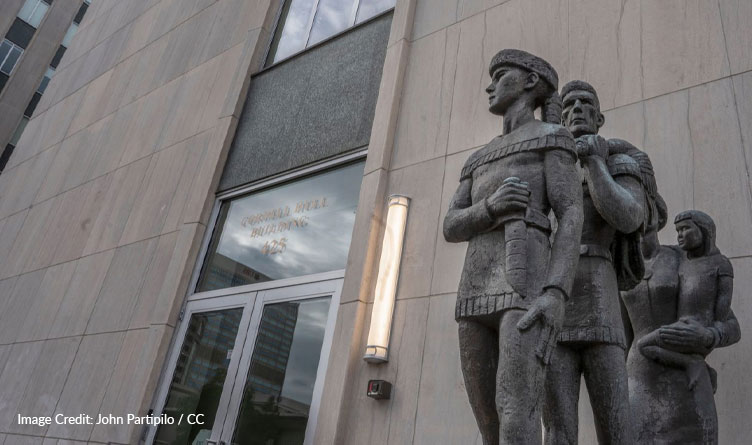Photo: The Cordell Hull Legislative Building. Photo Credit: John Partipilo
By Sam Stockard [Tennessee Lookout -CC BY-NC-ND 4.0] –
Tennessee lawmakers are looking at a $2.7 billion capital projects program for fiscal 2022-23 alone, plus the sale of property to reduce the state’s holdings in one of the boldest proposals to come along in years.
“It does fundamentally change the footprint of the state, I think, for generations,” Finance & Administration Commissioner Butch Eley, the governor’s new deputy, told lawmakers in a recent budget hearing.
Eley explained that many of the proposed 123 projects represent “strategic investment dollars” designed to last 30 years or more. The projects will be brought to the State Funding Board in a “staggered” fashion.
In addition, the state is prepared to attack $2.5 billion in deferred maintenance backlog, including $406 million in downtown office buildings alone.
The plan involves renovating the Legislative Plaza and War Memorial Plaza buildings and selling the James K. Polk and Citizens Plaza buildings, as well as moving out of leased property into state-owned buildings.
The state is negotiating a sale of the Citizens Plaza building to Metro Nashville government, along with putting the James K. Polk building on the market, which will eliminate $300 million in deferred maintenance, according to General Services Commissioner Christi Branscom. Funds from those sales will be used for capital maintenance.
The state’s most ambitious project involves construction of a Tennessee Law Enforcement Academy on 80 acres in Cockrill Bend, with a total cost of about $409 million, including $356 million in the next fiscal budget. It will house headquarters for the Department of Correction and Department of Safety and Homeland Security and include a firing range, emergency vehicle operations course, training academy, shoot house, driving track and underwater training area.
The project is designed to replace five locations, including the old law enforcement training academy, old Tennessee State Prison, Foster Avenue Department of Safety headquarters, the Tennessee Highway Patrol training center at the former Clover Bottom campus and the Tennessee Correction Academy in Tullahoma. The governor is trying to find an “economic driver” to replace the loss of the Tullahoma facility, according to Branscom.
A THP headquarters is also planned for a total cost of $72 million.
The Legislative Plaza, which was to be relegated to parking when legislators moved their offices to the Cordell Hull Building four years ago, is slated instead for $183 million worth of work.
The underground property was considered a money pit at the time because of water problems and questions about mold. But it is to be transformed, offering a military branch museum, visitors center, theater and conference rooms. Gov. Lee used it for his transition office after being elected four years ago..
Meanwhile, the War Memorial Building and Plaza will be renovated inside and outside, creating a “more park-like environment.” Non-working water fountains will be replaced, but statues and monuments are to be preserved.
Taking on those two projects will reduce deferred maintenance by $300 million, officials said.
The state has been focusing on its real estate portfolio since 2015, eliminating 1.2 million square feet of office space and 1,800 acres, bringing in $95 million. More leased space reductions are planned in Knoxville, Chattanooga and Memphis over the next six to seven years before the state has a large lease payment come due.
An “interactive dashboard” is to be launched in late 2022 detailing state land for sale, as part of the effort to shrink the state’s holdings and return property to tax rolls, Branscom said.
For the most part, lawmakers seem supportive of the massive undertaking, even as the state budgets 10-12% for rising construction costs.
Senate Finance, Ways and Means Committee Chairman Bo Watson, R-Hixson, pointed out it’s a “sizable amount of money.”
“But,” he said, “these are all large assets that will be around for the next 30 to 50 years, so from that perspective they’re good investments.”
Watson agrees that older buildings need to be sold as new facilities are constructed. Yet, senators did push back on the need for higher education projects, considering enrollments are likely to decrease because of a projected drop in birth rates.
*** Click Here to Support Conservative Journalism in Tennessee. We can’t bring you stories like this without your support!***
House Finance, Ways and Means Committee Chairman Patsy Hazlewood, R-Signal Mountain, called a simultaneous move to address deferred maintenance “critical to the future of the state.”
The governor funded positions to take on the additional workload. But Hazlewood noted, “I would hope we recognize these are unprecedented dollars. When we look at these, the positions are not in there forevermore.”
Branscom responded that several people in the Department of General Services are retiring and creating openings.
Gov. Bill Lee’s $52.6 billion spending plan for next fiscal year includes $214,791 for maintenance, $1.4 billion for general government and $1.1 billion for higher education, including $250 million for Tennessee State University.
Of that total, $26.4 billion comes from state revenue, $19.8 billion from the federal government and $6.4 billion from other sources.
Republican leaders consistently point toward “conservative” budgeting and spending as well as the lack of an income tax in Tennessee as measures they’ve used to keep the state budget in good shape.
House Minority Leader Karen Camper, though, says one of her goals is to highlight the “immense contributions” made by President Joe Biden, the Democratic-controlled Congress and the Improve Act to the governor’s proposed budget.
“We talk about how we are going to be able to use this tremendous $2.7 billion to transform our state, but only briefly and quietly mention that the majority of this funding is actually coming from the Democrats in Washington,” Camper says. “I want to make sure it’s clear to everyone that without President Biden we wouldn’t be able to achieve this unprecedented investment in our roads, bridges and buildings.”
For instance, a $200 million Department of Health laboratory is being funded with federal funds, and $180 million is going toward the Department of Intellectual and Developmental Disabilities. The department also will run mobile clinics in rural areas.
The governor’s budget plan includes $626.5 million for transportation and infrastructure, including $266 million for a state highway partnership, $100 million extra for the IMPROVE Act, which targets road projects statewide, and $176 million for rural interchanges.
The state is also setting aside $647 million for work on the Moccasin Bend Mental Health Institute in Chattanooga, Wilder Youth Development Center, a Tennessee Emergency Management Agency operations center and a TEMA warehouse. The scope of those projects remains uncertain.

About the Author: Sam Stockard is a veteran Tennessee reporter and editor, having written for the Daily News Journal in Murfreesboro, where he served as lead editor when the paper won an award for being the state’s best Sunday newspaper two years in a row. He has led the Capitol Hill bureau for The Daily Memphian. His awards include Best Single Editorial from the Tennessee Press Association. Follow Stockard on Twitter @StockardSam




